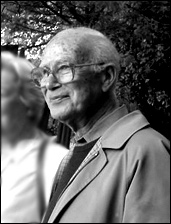A. Gerald Shaper, MD
Born: 1927

Gerald Shaper was educated at the University of Capetown and is retired from the Department of Primary Care and Population Science, Royal Free and University College Medical School, London, after years of directing the British Regional Heart Study (BRHS). He became involved early with CVD epidemiology while in training with John Brock and Brian Bronte-Stewart who in the late 1940s were already comparing diets, blood lipids, and vascular disease among ethnic groups of South Africa. In Kampala, he studied ethnic differences among native Ugandans who migrated to cities compared to those living in the bush.
Shaper’s early contributions include the first demonstration, among Ugandans, that advanced, neglected diabetes and widespread hypertension were not associated with atherosclerotic disease in Africans. His were also among the first findings that Africans had little age trend in cholesterol and blood pressure, whereas Asians and Europeans had clear trends. And he found that Africans, Asians, and Europeans differed in fibrinolytic and platelet activity. He put the matter as follows: “It kept coming back to the issue that nutrition was absolutely fundamental to the atherosclerosis-coronary heart disease problem.”
On returning to the UK after years in Africa, he found no interest in the diet-lipid-heart hypothesis. “I realized […] that within Great Britain there was tremendous opposition, even hostility, to the American diet-heart and cholesterol hypothesis. People like Jerry Stamler and Ancel Keys raised the blood pressure of British cardiologists to a level which was not believable. It was something strange; it was not rational, it was not scientific.” In consequence, he “parachuted” CVD endpoints, as potential confounders, into the BRHS, a study designed to investigate water hardness and heart disease, converting it into a prospective multifactor, multidisease cohort study.
Shaper has effectively articulated arguments for prevention policy and practice in a medical community slow to accept epidemiological evidence or to forward public recommendations for lifestyles and prevention. He described in our interview the politics that surround funding and production of government reports from his years with the UK Medical Research Council. There he also expressed concern that modern conclusions about CVD are becoming overwhelmed by statistical techniques and moving too far from biological models of disease.
Professor Shaper continues writing from BRHS data in retirement in West Yorkshire. (HB)
Sources
Oral history with Henry Blackburn, May 31, 2002.